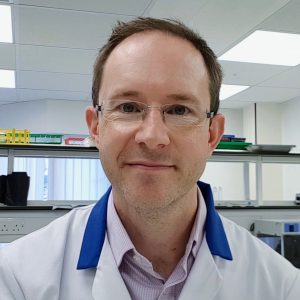Welcome to The Friday Prof-ile – a chance to get to know some of our recently appointed Professors and Associate Professors a little better. Every Friday, we’ll be asking a different person the same set of questions to get an insight into their life, work and what makes them tick.
This week, we’re chatting with Associate Professor in Bioanalytical Chemistry, Richard Paul…

Richard Paul
What are your research interests? What made you want to study these areas?
I’m a bioanalytical chemist and my particular focus is the study of biomarkers for forensic and medical applications. Essentially, I apply chemistry and instrumentation to solve problems. What I love most about this discipline of chemistry is the variety. I could be developing techniques for forensic casework, searching for traces of drugs in the environment, or using chemistry to contribute to the early detection of cancer – it can be very diverse!
What has been your career highlight to date?
A couple of years ago I was asked to design and implement an analytical protocol that would be capable of detecting traces of psychoactive drug fumes in indoor air in UK prisons.
There have been increasing complaints from staff working in prisons of secondary exposure to psychoactive drug fumes, and our work is contributing to the evidence base on this issue. The technical challenges the research presents are very significant. Drug fumes from smoking are diluted within the air of a large building, and so are at very low concentrations. There are also issues of thermal degradation, and complicated logistics of deploying the technology within prisons that have made the project exceptionally challenging.
Working with the various organisations involved on this complex, high pressure commission has been very rewarding.
What are you working on at the moment?
I lead a project researching skin cancer metabolomics. We’ve developed a non-invasive technique to capture and identify volatile chemicals released from skin cancer sites. We’ve just completed a trial to assess the viability of the technique on cancer patients, and are now wading through the results. Developing and testing the technique was tricky, but the results are quite exciting. We’re seeing a lot of interesting biomarkers, some of which could be quite significant.
If you weren’t an academic, what would you be doing?
I’d probably be an analytical chemist working in industry, but really nothing motivates me more than the variety and opportunities of the job as an academic.
What do you do to unwind?
I’m fairly obsessed with guitars so if I’m not playing guitar, I’m reading about guitars. Music in general is important to me.
What’s the best thing about Bournemouth?
If we’re talking about the town, then I’d say the beach. I’m not a local, so it still feels like a holiday destination sometimes! In terms of the university itself, I’d say the culture here and my colleagues across the faculty.
If you could pick any superpower, what would it be and why?
The ability to control time and space. Surely the most useful on the superpower wish list!
If you were stranded on a desert island, what one luxury item would you take with you?
A 1959 Les Paul and a Marshall stack, plus some kind of everlasting power supply.
What advice would you give to your younger self?
When opportunities present themselves, say yes.











 Dr. Ashraf cited on ‘Modest Fashion’ in The Guardian
Dr. Ashraf cited on ‘Modest Fashion’ in The Guardian NIHR-funded research launches website
NIHR-funded research launches website Academics write for newspaper in Nepal
Academics write for newspaper in Nepal New paper published on disability in women & girls
New paper published on disability in women & girls MSCA Postdoctoral Fellowships 2025 Call
MSCA Postdoctoral Fellowships 2025 Call ERC Advanced Grant 2025 Webinar
ERC Advanced Grant 2025 Webinar Horizon Europe Work Programme 2025 Published
Horizon Europe Work Programme 2025 Published Horizon Europe 2025 Work Programme pre-Published
Horizon Europe 2025 Work Programme pre-Published Update on UKRO services
Update on UKRO services European research project exploring use of ‘virtual twins’ to better manage metabolic associated fatty liver disease
European research project exploring use of ‘virtual twins’ to better manage metabolic associated fatty liver disease